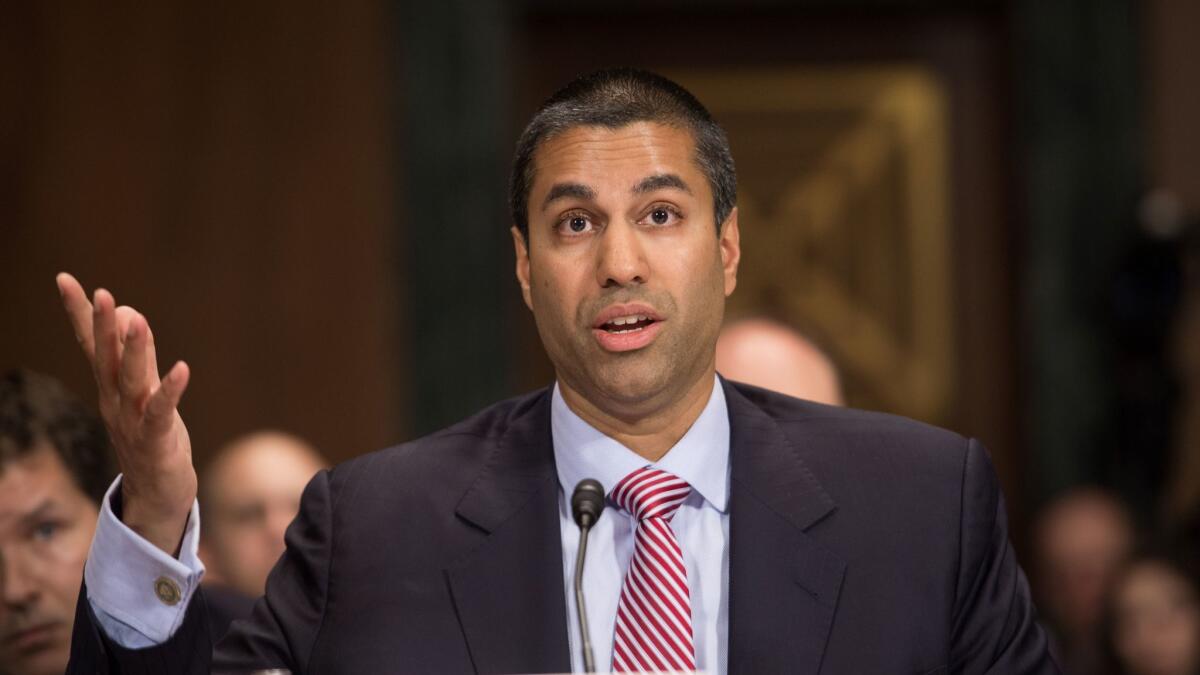FCC chief says media aren’t the enemy of the people. He dodged the question earlier

Reporting from Washington — The news media are not the enemy of the American people, the new head of the Federal Communications Commission said after dodging the question at a Senate hearing this month.
“A free media is vital to our democracy,” FCC Chairman Ajit Pai wrote last week to Sen. Bill Nelson (D-Fla.), who released the letter Monday.
“That is why during my time at the commission I have consistently opposed any effort to infringe upon the freedom of the press and have fought to eliminate regulations that impede the gathering and dissemination of news,” said Pai, a Republican who has served as a commissioner since 2012.
His views are important because the FCC has oversight over many federal regulations covering the news media, including access to public airwaves and limits on ownership of broadcast stations and newspapers in the same market. The agency also often must decide whether to approve major media mergers.
Pai was criticized by Democrats and public interest advocates for not taking a position at a March 8 Senate Commerce Committee hearing on comments by President Trump that were highly critical of many news organizations.
In a March 10 letter also signed by his 12 Democratic colleagues on the committee, Nelson asked Pai directly if he believed the media to be the enemy of the people, as Trump has stated.
Pai responded with a simple, “No.”
But Pai prefaced his response by writing that “the president has made clear that he was referring to ‘fake news’ ” as the enemy of the people.
On Feb. 17, Trump said on Twitter that “the fake news media” was not his enemy but “it is the enemy of the American people.” Trump included in that group the New York Times, NBC, ABC, CBS and CNN.
A week later, Trump suggested at the Conservative Political Action Conference that the fake news media included outlets that wrote articles using anonymous sources.
“I’m against the people that make up stories and make up sources,” he said. “They shouldn’t be allowed to use sources unless they use somebody’s name. Let their name be put out there.”
Two Democrats had pushed to get a response from Pai to those statements at the March 8 hearing. It was Pai’s first congressional appearance since Trump elevated him to chairman and came a day after the two met in the Oval Office. After that meeting, Trump nominated Pai for another five-year term at the FCC.
“Do you agree with President Trump that the media is the enemy of the American people?” asked Sen. Tom Udall (D-N.M.).
Pai said he didn’t “want to wade into the larger political debates.” Pai affirmed statements in the past he had made supporting free speech and “respectful and robust public debate.”
Pressed by Udall, Pai would say only, “I believe that every American enjoys the 1st Amendment protections guaranteed by the Constitution.”
Later at the hearing, Sen. Maggie Hassan (D-N.H.) said she wanted to give Pai another chance to answer the question. He again declined, repeating the same points.
“I wish your answer had been a little different,” Hassan responded.
After the hearing, Craig Aaron, head of public interest group Free Press, said, “Pai’s refusal to speak out against attacks on the press is outrageous and dangerous.”
“We’re entering uncharted waters when the nation’s top media regulator — head of the allegedly independent agency that guards the public airwaves — won’t stand up for press freedom,” Aaron said.
Nelson and the other lawmakers said in their March 10 letter to Pai that the FCC chairman’s “refusal to answer straightforward questions about how you view the media and whether you will uphold the 1st Amendment rights of journalists and media outlets is concerning.”
In his response, Pai pledged to “continue to respect the 1st Amendment.”
In response to a series of yes-or-no questions in the letter, Pai said he would not do anything that “stifles or penalizes free speech by electronic media, directly or indirectly, even if requested by the administration.” He also committed to operating independent of the White House and to inform the committee of any attempt by the administration to influence his decisions.
Trump says businesses can’t borrow because of Dodd-Frank. The numbers tell another story »
Follow @JimPuzzanghera on Twitter
More to Read
Inside the business of entertainment
The Wide Shot brings you news, analysis and insights on everything from streaming wars to production — and what it all means for the future.
You may occasionally receive promotional content from the Los Angeles Times.











